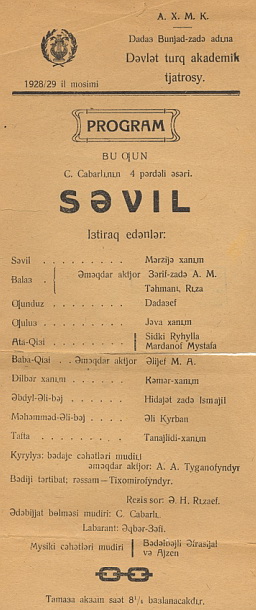Sevil (1928 Play) on:
[Wikipedia]
[Google]
[Amazon]
 ''Sevil'' is a play by Azerbaijani playwright Jafar Jabbarly written in 1928. It focused on the theme of the role of women, their oppression, struggle, and ultimately, victory over dated
''Sevil'' is a play by Azerbaijani playwright Jafar Jabbarly written in 1928. It focused on the theme of the role of women, their oppression, struggle, and ultimately, victory over dated
Online version of Sevil
at Azeri.org 1928 plays Works by Jafar Jabbarly Theatre in Azerbaijan Women's rights in Islam Works about women Feminist plays Anti-religious campaign in the Soviet Union Plays adapted into films Azerbaijani-language plays
patriarchal
Patriarchy is a social system in which positions of Dominance hierarchy, dominance and Social privilege, privilege are primarily held by men. It is used, both as a technical Anthropology, anthropological term for families or clans controll ...
traditions. Many women discarded their veils in the city theater after seeing the play.
Later adaptations of the play were less extreme compared to the original. It was made into a film with the same title in 1929, which was shown throughout Central Asia and the Caucasus.
Plot
The action takes place inBaku
Baku (, ; az, Bakı ) is the capital and largest city of Azerbaijan, as well as the largest city on the Caspian Sea and of the Caucasus region. Baku is located below sea level, which makes it the lowest lying national capital in the world a ...
in 1918-1919. Sevil and Balash is an Azerbaijani couple of peasant origin. While Sevil dedicates herself to home and family, Balash achieves some position in society and despises his wife for her simple manners. When she gives birth to a daughter instead of a son, he leaves her with the newborn baby. After some time passes, Balash is a major exchange trader, living in Baku with a beautiful young singer named Dilber. He becomes involved in Baku's aristocratic high society associated with Musavat government and White army officers. At the same time, Sevil still lives in the village and dreams of being reunited with her husband. Balash's sister and father sympathise with Sevil and convince her to go to Baku to persuade Balash to get back to the family.
They arrive at Balash's mansion and finds out that a large feast is held there. Balash is outraged that they dared to spoil his party with their peasant look. He orders to take away Sevil's daughter and throw her out of his house with his own father and sister. Sevil finds herself on the street and observes the life of ordinary citizens and workers. She begins to be involved in the revolutionary movement. At the same time, Dilber robs Balash by stealing his securities and money and leaves him. She flees from Baku escaping from the advancing Red Army, while Sevil is tearing off her veil and walks in the columns of the revolutionary crowd. In desperation, Balash tries to shoot Sevil.
Ten years have passed. Sevil returns to Baku after several years of study in Moscow. She is reunited with her daughter and they happily drive through a new, modern Baku, while squalid and miserable Balash silently stands in the crowd - he had no place in Soviet society.
See also
*Statue of a Liberated Woman
Statue of a Liberated Woman is a statue by Fuad Abdurahmanov. It was built in 1960 at the Public Square at the branching of Gurbanov and Cafar Cabbarli streets in Baku, Azerbaijan, and was inspired by the character of Sevil from the Jafar Jabbarly ...
* Theatre in Azerbaijan
Azerbaijani theatre ( az, Azərbaycan teatrı) – is a theatrical art of the Azerbaijani people.
History
Sources of Azerbaijani theatrical art lie on ancient holidays and dances.
* Women in Azerbaijan
Notes
References
*{{cite book, last=Heyat, first=Farideh , title=Azeri Women in Transition: Women in Soviet and Post-Soviet Azerbaijan, date=2002, publisher=Routledge, location=Oxon, UK, isbn=1136871705, pages=98–102, url=https://books.google.com/books?id=kp0AAwAAQBAJExternal links
Online version of Sevil
at Azeri.org 1928 plays Works by Jafar Jabbarly Theatre in Azerbaijan Women's rights in Islam Works about women Feminist plays Anti-religious campaign in the Soviet Union Plays adapted into films Azerbaijani-language plays